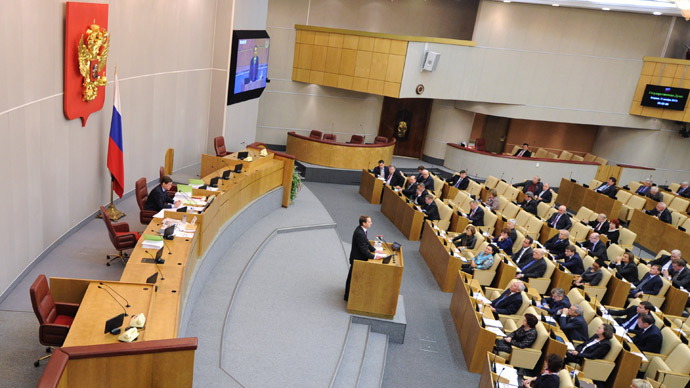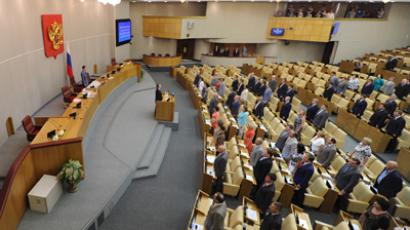Russian parliamentary parties form councils to filter ‘stupid’ bills

Russian MPs have decided that the State Duma has seen enough shocking and farcical initiatives drafted with the sole purpose of drawing attention to their authors.
All four main parliamentary parties now have their own commissions that ensure that MPs abide by commonsense and logic while writing new laws, Izvestia daily reported.
Majority party United Russia was the first to announce that they were setting up a ‘zero hearing’ group last fall, which aimed at reviewing and weeding out draft laws that are openly populist or nonsensical. Now, all parliamentary opposition parties said they have established similar bodies.
A top member of the Liberal Democratic Party has told Izvestia that their parliamentary group was setting up a consultative council manned by MPs and lawyers who would write expert conclusions, allowing the party to decide whether the new bills should be submitted for parliamentary hearings.
“We used to have no precise regulations which bills should be submitted and which should not. But there are some bills that stir up the society or simply amuse the public and therefore we think that we need such council,” Vladimir Ovsyannikov, deputy head of the Liberal Democratic caucus in the Lower House told Izvestia.
Communist Party MPs also said that they had a working group that performed a similar function. In addition, the group provided advice to parliamentarians who had to work on bills outside their area of expertise. “An MP cannot be an expert in all spheres of life, he needs advice, consultation and help,” Sergey Reshulskiy explained.
Oganes Oganyan, deputy head of the Fair Russia caucus, said that his party had a special expert group that advised parliamentarians and suggested changes to prepared bills.
Submitting humorous or provocative bills has become a trend in Russian politics. Sometimes, MPs aim to draw public attention to problems by satirizing them, but more often the suggestions appear to be little more than simple attention-seeking.
For example, Liberal Democratic MP Sergey Ivanov recently submitted a bill that imposed restrictions on the sale and use of garlic, as the consequences of its use were extremely negative for demographics. The bill was apparently an April Fools’ joke, but for some time it remained in the Lower House register, and then disappeared without any explanation.
Other weird initiatives included a bill banning the public use of foreign words, and one changing the title of top office from the President of the Russian Federation to the Russian Tsar.
Regional legislatures also occasionally draft openly ridiculous bills, like one in St. Petersburg that would have outlawed the stomping of cats and loud sex in a bid to ensure city folk get a good night’s sleep. The bill was approved without the odd articles after its main sponsor publicly admitted that by drafting it he only wanted to draw more attention to the problem.














